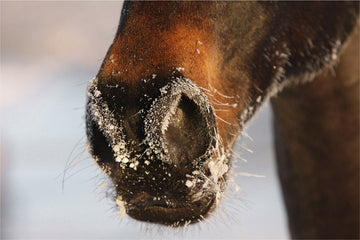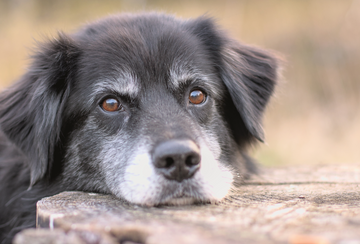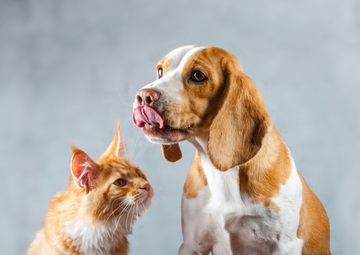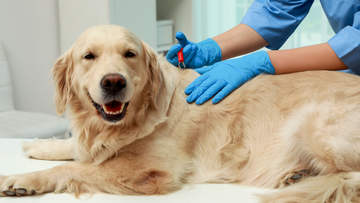The fear of being diagnosed with "huffiness" is a major concern for many horse owners. This chronic respiratory disease, often accompanied by symptoms such as coughing and shortness of breath, can severely impact a horse's quality of life. However, it's not just huffiness; other respiratory problems such as bronchitis or recurring coughs are also common in horses, especially during the colder months or when air circulation in the stable is poor. What can you do to keep your horse's respiratory system healthy and support it? And which natural remedies are particularly effective? In this article, you'll learn how respiratory diseases develop in horses and how you can effectively support your horse's respiratory system.
Respiratory diseases: An overview of causes and risk factors
Horses have a particularly sensitive respiratory system. The horse's lungs are powerful and capable of processing large volumes of air during movement. However, this very ability makes the airways vulnerable to irritation and inflammation. Horses that spend a lot of time in stables or are regularly exposed to hay dust are at increased risk of suffering from respiratory diseases.
Environmental causes
Dust and allergens in stables
Most horses spend most of their lives in stables. While this is often necessary, it results in constant exposure to dust and other irritants such as ammonia, fungal spores, and bacteria. Hay, in particular, can contain large amounts of dust, which irritates the mucous membranes of the respiratory tract. In winter, when windows are often closed and air circulation is poor, the strain on the respiratory system increases significantly.
Hay and mold
Hay is a common cause of respiratory problems. Not only dust, but also mold spores found in poorly stored or damp hay pose a risk. These tiny particles can penetrate deep into the lungs and cause inflammation. This is especially problematic for horses prone to allergies or chronic respiratory diseases.
Dry air in winter
During the cold months, many horses are kept in stables to protect them from the elements. However, the dry air and lack of air circulation in the stable can dry out the respiratory tract and make them more susceptible to infections.
Genetic and individual risk factors
In addition to environmental factors, there are also individual risk factors that play a role in the development of respiratory diseases.
allergies
Like humans, horses can suffer from allergies. An allergic reaction to dust, mold, or pollen can lead to chronic respiratory problems. These horses are more sensitive to dust and other irritants and are more likely to develop symptoms such as coughing, nasal discharge, or shortness of breath.
Age of the horse
Older horses are at increased risk of developing respiratory diseases. With age, lung elasticity decreases and the immune system weakens. This can lead to older horses being more likely to suffer from chronic respiratory problems such as recurrent airway obstruction (RAO).
Breed and disposition
Certain horse breeds appear to be more susceptible to respiratory diseases. Warmbloods and Thoroughbreds tend to be more sensitive to dust and allergens. The horse's housing and use also play a role: Sport horses undergoing intensive training are at a higher risk of respiratory diseases due to the high physical strain.
The most common symptoms: When should you act?
It's important to react at the first signs of respiratory illness. Respiratory problems often develop gradually, and what begins as a mild cough can quickly develop into a more serious condition such as bronchitis or even chronic breathing problems.
Early signs of respiratory diseases
-
Dry or wet cough
An occasional cough may be normal, but a recurring cough, especially during or after work, should be considered a warning sign. A dry cough often indicates irritated mucous membranes, while a wet cough indicates mucus production and possibly an infection. -
nasal discharge
Clear, watery nasal discharge can indicate allergic reactions or respiratory irritation. If the nasal discharge becomes thicker and turns yellowish or greenish, it could be a sign of a bacterial infection. -
Heavy breathing and increased respiratory rate
A horse with respiratory problems often exhibits an increased respiratory rate and difficulty breathing, especially after physical exertion. In severe cases, the horse may have difficulty breathing or even develop respiratory distress even at rest.
Chronic respiratory diseases
Long-term untreated respiratory problems can lead to chronic diseases that significantly impair the horse's quality of life.
Damping (RAO)
Recurrent airway obstruction (RAO), also known as chronic obstructive bronchitis (COB) or recurrent airway obstruction (RAO), is one of the most common chronic respiratory diseases in horses. It is comparable to asthma in humans and commonly occurs in older horses that have been exposed to dust and allergens for extended periods. Horses with RAO often have a chronic cough and difficulty breathing, especially during physical exertion.
Chronic bronchitis
Chronic bronchitis often develops from untreated acute respiratory infections. It leads to persistent inflammation of the bronchi and can permanently impair the horse's performance. Common symptoms include a persistent cough and increased mucus production.
Prevention and support: What can you do?
The good news is that respiratory diseases can often be prevented or alleviated with good care and husbandry. In addition to an optimal stable environment, there are several ways you can naturally support your horse's respiratory system.
Optimal stable housing
-
Good ventilation
Proper ventilation of the coop is crucial to minimize exposure to dust and allergens. Regular ventilation and good air circulation help prevent harmful particles from accumulating in the air. Especially in winter, when windows are often closed, you should ensure that fresh air enters the coop without creating drafts. -
Low-dust bedding and hay feeding
Use low-dust bedding such as wood shavings or dust-free straw to reduce respiratory stress. Hay should be either steamed or watered to remove dust and mold spores. Special hay steamers are available that heat hay to a safe temperature, thus killing potentially harmful microorganisms. In this case, the hay remains stable for about 24 hours. Leftover wet (watered) hay should be disposed of after 6 hours at the latest, ideally after 3 hours, as otherwise harmful germs can multiply on it, posing a health risk to the horse. -
Regular exercise
Horses that are exercised regularly often have fewer respiratory problems, as moderate exercise supports lung function and promotes the removal of mucus. It's especially important to take horses outside regularly in winter, even if the weather isn't ideal.
Natural support through herbs and nutrients
Nature offers numerous effective remedies for caring for your horse's respiratory system in a gentle and supportive way. Here are some of the most important natural ingredients with proven positive effects on the respiratory system.
thyme
Thyme is one of the most widely used herbs in the treatment of respiratory diseases, both in humans and animals. Thyme contains essential oils, including thymol, which have traditionally been used to loosen trapped mucus and support the respiratory system. Its properties are often used to relieve coughs, and thyme is also valued for its antimicrobial effects.
Ribwort plantain
Ribwort plantain has long been used in naturopathy to soothe irritated mucous membranes. Its mucilage can ease coughs and help calm the airways. Ribwort plantain is often used on horses prone to irritation from dust or allergens.
fennel
Fennel is used not only for digestive problems but also to support the respiratory system. It can help loosen mucus and ease coughing. Fennel is also known to have a soothing effect on the mucous membranes of the respiratory tract.
black cumin
Black cumin contains polyunsaturated fatty acids, which are believed to have anti-inflammatory properties. This ingredient has traditionally been used to support the respiratory system in horses with chronic problems while also strengthening the immune system.
Vitamin C and Vitamin E
These two vitamins are essential for a strong immune system and are important for maintaining healthy respiratory tracts. Vitamin C helps the body defend itself against pathogens, while vitamin E acts as an antioxidant, helping to protect cells and support the recovery of inflamed mucous membranes.
eucalyptus
Eucalyptus is known for its powerful expectorant properties and is often used to treat respiratory illnesses. Eucalyptus essential oils can help open the airways and loosen mucus. It can be used as an inhalant or as a feed additive, especially for acute respiratory symptoms.
licorice root
Licorice root is traditionally used to relieve coughs and soothe mucous membranes. It can help relieve respiratory problems in persistent coughs without further irritating the mucous membranes.
How IMUN Horse® "Resp" supports the respiratory tract
IMUN Horse® "Resp" is a supplementary feed specifically developed to support the respiratory system of horses. It contains a combination of natural herbs and nutrients that work together to strengthen the bronchi and mucous membranes.
What makes IMUN Horse® "Resp" special?
-
Natural ingredients to support mucous membranes
The bronchial herbs contained in the formula, such as thyme, ribwort plantain, and fennel, are gentle yet effective. These herbs have been known for centuries for their beneficial properties for the respiratory tract and support mucus clearance without irritating the mucous membranes. -
strengthening the immune system
In addition to directly supporting the respiratory system, IMUN Horse® "Resp" can also contribute to the general strengthening of the immune system. The vitamins and nutrients it contains can help your horse fight off pathogens and mobilize its natural defenses. This is especially important during the cold season or for horses prone to respiratory problems.
Application and dosage
IMUN Horse® "Resp" is easy to use. It comes in pellet form, which can be easily added to the daily feed ration. The dosage depends on your horse's weight, and it is recommended to feed the product over a period of several weeks for a sustained effect. If your horse participates in competitions, please ensure you observe the 48-hour withdrawal period according to the FN-ADMR.
Additional tips for healthy respiratory tract: How to optimize posture and feeding
-
Improve microclimate in the stable
Many riders know how important ventilation is, but specifically controlling the microclimate in the stable can make a real difference. Natural moisture sources such as water buckets or plants in the stable can improve humidity without causing mold. Humidity binds dust particles, so fewer harmful particles are inhaled. -
Evaporate essential oils in the stable
A relatively unknown method is the use of essential oils in the stable. These can be distributed in a diffuser or by vaporizing them. Oils such as eucalyptus or peppermint can help support your horse's respiratory system, especially during times of allergic irritants. -
Alternating grazing times and "dust avoidance days"
An interesting approach is to specifically adjust grazing times on particularly dry or windy days, when a lot of dust is stirred up. It may be beneficial to keep the horse indoors with good ventilation on such days to minimize dust exposure. Conversely, grazing times should be increased after rainy days, as dust exposure is significantly lower then. -
Introduction of plant diversity on the pasture
Promoting a diverse plant structure in the pasture can reduce respiratory problems. By sowing plants like ribwort plantain, chamomile, and fennel in the pasture, your horse can benefit from natural herbs that support his respiratory system without the need for feeding.
These tips offer additional ways you can optimize your horse's housing and nutrition to keep his respiratory system healthy. Sometimes small changes can have a big impact.
Prevention and natural support for healthy respiratory tract
Respiratory diseases such as coughs and bronchitis are stressful for horses and, if not treated promptly, can lead to chronic problems. However, with proper care, exercise, and natural support, you can do much to keep your horse's respiratory system healthy. In addition to fresh air, sufficient exercise, a low-dust environment, and a balanced diet, you can rely on products such as IMUN Horse® "Resp," which are specifically formulated to meet the needs of the respiratory system.
Remember: prevention is better than cure. By supporting your horse's respiratory system from the start, you can ensure long-term well-being and health – naturally.












